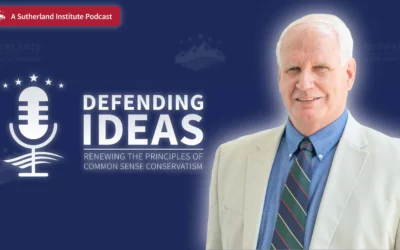
Written by The Likely Voter
November 2, 2023
![]()
The state supreme courts of Maryland and New Jersey are set to review cases involving lawsuits over religious freedom and LGBTQ rights. With court battles like this becoming more common, one Sutherland Institute expert suggests that legislatures can get ahead of anti-discrimination and religious exemption conflicts by proactively addressing these issues through legislation.
Sutherland’s constitutional law and religious freedom policy fellow, Bill Duncan, wrote about the legal implications regarding these two cases in his recent Insights piece.
Duncan points out that Utah has a good example of proactive legislation that preempts legal challenges. During the 2015 legislative session, the Utah Legislature proactively passed SB296 and SB297.
SB296 provides legal protections based on gender identity for individuals in housing and employment, while SB297 grants religious exemptions for employees with deeply held beliefs.
As New Jersey and Maryland deal with cases within their respective state supreme courts on issues similar to what was addressed in Utah’s SB296 and SB297, Duncan says it’s important to realize the limitations of the courts and the effectiveness of the legislature.
“The most positive part of the 2015 legislation was that Utah said, ‘What’s a scenario where there’s likely to be trouble?’” said Duncan in a recent interview, “and then they created a system that accommodated and respected everyone.”
Taking this approach, Duncan said, was beneficial for both communities, as it allowed for more thorough and clear protections while balancing diverse interests through legislation – something harder to do through the court process.
“When a case comes before the courts, the court can only address the specific issue at hand,” Duncan said. “The legislature, however, can be broader and provide more thorough protections and exemptions.”
Utah, by passing SB296 and SB297, has “avoided a lot of trouble as a result,” he said.
As these kinds of issues arise in the news, voters should remember that consensus-building through the legislative process can often be a more collaborative and productive process – yielding better results for citizens.

For a more in-depth perspective on this article, read our Insights piece here.
Takeaways: the most important things voters need to know. For civically engaged citizens.

- Utah’s 2015 anti-discrimination and religious freedom legislation shows its worth in light of court cases in New Jersey and Maryland.
- Legislation affords better balanced protections than a court’s interpretation of a specific case.
- Voters should remember the distinct roles of legislative and judicial processes when addressing complex issues.
More Insights
Read More
Protecting property rights against government overreach
While governments can continue to regulate land use, these regulations and fees must be justified by a government interest and proportional to the effect of the development’s impact on that interest.
Do we need to care about the Utah State Board of Education?
For any Utah voters who also feel like K-12 public education is headed in the wrong direction, learning about the candidates running for a seat on the Utah State Board of Education (USBE) is a wise choice this election season.
Defending education choice the right way
Education choice has exploded in popularity across the nation in recent years. So why does it remain a contentious point of debate in some parts of the country?



